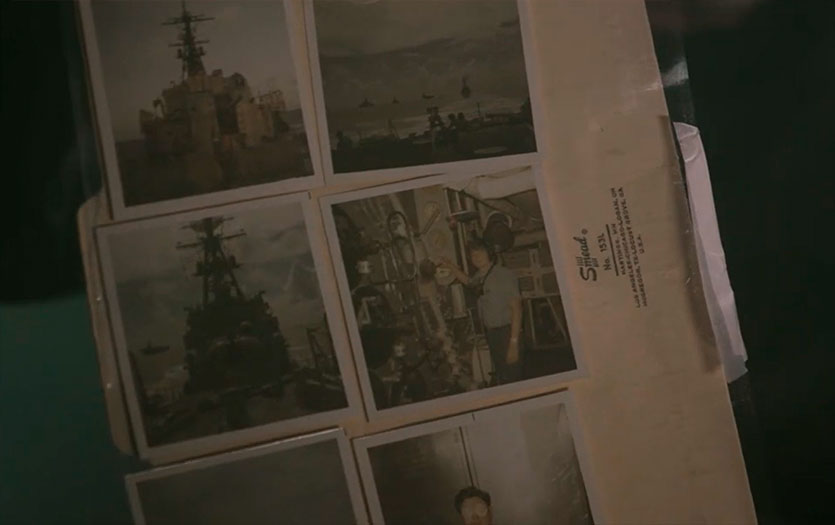
This post was written by Courtney Leach, social media manager, Parkview Health.
Jackie Kintz is a mother.
She is a full-time Parkview employee.
She is a cheerleader and a coordinator and a caregiver.
A wife and a friend and a woman of faith.
Jackie Kintz is many things, including, as of July, a warrior fighting to beat cancer.
Friday, September 14, 2018
A diagnosis cannot define a woman like Jackie, It didn’t take me long to come to arrive at that conclusion. I met her and her husband, Tim, for the first time on a Friday afternoon in late September. She was sitting in a recliner in an infusion bay at the Parkview Cancer Institute (PCI), waiting to receive the first of her 16 chemotherapy and radiation treatments (20 weeks of treatment total) for breast cancer.
The first thing I noticed was her smile. Jackie has one of those grins that turns the lights on for everyone else in the room, like expression-induced endorphins, and the apples of her cheeks punctuated a pool of joy clearly residing beneath the surface of her skin. By the time I set my bag down on that very first day, I didn’t feel like Jackie was a stranger anymore. It was that quick. With some people, it just is.
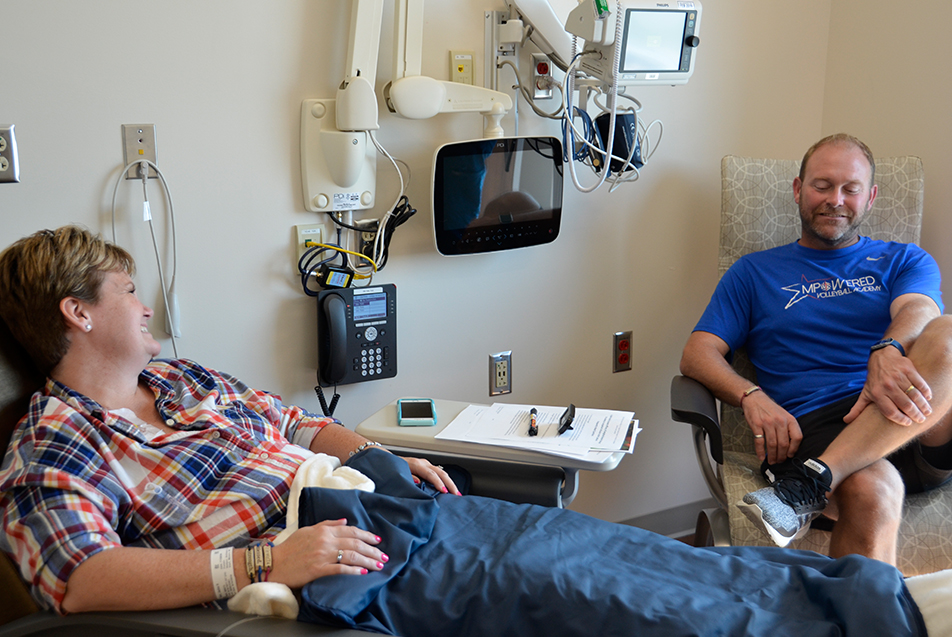
While this was the first time I was setting eyes on Jackie, I’d been connected to her a few weeks prior, via a thread of emails. As most people know, October is Breast Cancer Awareness Month, and we are always trying to find dynamic ways to bring attention to the cause. Highlighting a patient who was going through treatments seemed like an impactful approach. The patient would have to be open, of course. He or she would have to be willing to have his or her story shared with potentially thousands of readers. The patient would have to be someone people could relate to, and empathize with.
Not long after making the request, Jackie’s name showed up in my inbox, a recommendation from PCI leaders. We began exchanging messages, coordinating the days and times I would sit with her. When she mentioned her first treatment was September 14, I offered to wait, and let that be a private day.
“I can meet you for the next treatment, if you’d like to get the lay of the land this time,” I sent, careful to be sensitive to her situation.
“I’m open to anything! Since I’ve never done this before, I don’t really know what to expect. I’d say, if we’re going to do it, let’s do it. I’m pretty easy going,” she responded.
And so, on one of the last blazing hot days of the year, perhaps the summer of 2018’s boldest encore, I made my way up to the third floor and met my spirited subject.
She was receiving saline through her port (a small disc placed under the skin where an IV can be connected to administer medications) for the first several minutes. A woman in a freshly pressed lab coat approached carrying a white, folded blanket.
“I volunteered to be part of a research study, too,” Jackie told me. “I figured I might as well just do it all!”
The researcher asked her a series of questions.
“How would you rate your anxiety right now, on a scale of 1-10?”
“Ah, maybe a 3,” Jackie answered.
She placed the weighted blanket, stuffed with microbeads made from recycled glass, over Jackie’s lap and told her she’d be back to run through the same questions at the end of her treatment.
“Only a 3?” I asked, running the blanket between my thumb and middle fingers. “You’re pretty tough, Jackie.”
“I’m tellin’ ya, I was the perfect person for this to happen to,” she said. “I’m not worried. I’ve worked here forever and I know that I am going to be OK. I couldn’t ask for better treatment.”
Jackie has been with Parkview oncology for 19 years. She knows the staff, the beautiful new building, and a good number of the clinical buzzwords. But more than anything, Jackie knows this: That God’s timing is always right. In the hours we would spend together, Jackie displayed an unwavering peace and confidence in her journey.
Her case didn’t present with the common symptoms. Back in March, she noticed some itching and sagging on her left breast. “I was a little overdue for my mammogram,” she admitted, so she had an ultrasound and x-ray, both of which came back normal. In June, she went in for her annual OB/GYN checkup and the physician didn’t like what she saw. “She ordered an MRI, and by July I was in seeing Dr. Han. It’s a testament to being persistent. You know your body, and you know when something isn’t right. It would have been really bad if I would have waited.”
Jackie has three daughters, ages 12, 17 and 20. “I told the kids, it was small, we caught it early and I’m going to be fine. Tim took it well. I think he was a little overwhelmed at first, but–”
“She did a great job of explaining the prognosis,” Tim said, “and really didn’t give us any time to think it was something more serious.”
The infusion nurse came over and sat down next to Jackie. She was wearing a protective paper gown and holding a clear bag with two syringes, each filled with vibrant candy red liquid.
“Is that the chemo?” I asked.
“Yes,” the nurse said. “This is the Adriamycin®, her first form of chemo. It will go in over the course of 8-9 minutes.”
She placed the end of the syringe in the tube leading to Jackie’s port and very slowly began injecting the medication. The slightest change – a flash of hesitation – came across her face.
“Can you feel it?” I asked.
“I don’t feel anything,” she shrugged.
“This is the medication that will make your hair fall out,” the nurse said, scrunching up her nose with an empathetic glance toward her patient.
“I just hope I have a nice shaped head!” Jackie said.
For all intents and purposes, Jackie is currently cancer-free. Linda Han, MD, performed a lumpectomy procedure on August 6 to remove the cancerous mass, but Jackie’s form of cancer was what’s known as triple negative, which means doctors aren’t sure what’s feeding the cancer. A good number of breast cancers are fueled by the hormones progesterone or estrogen, and when the doctors identify the source, the treatment can be a bit more straightforward. But in Jackie’s case, Melanie Clark, MD, her oncologist, opted for a more aggressive treatment plan, just to be sure.
“They’re going for the cure,” the nurse told her. “They’re going to hit it hard and knock the cancer out.”
This means Jackie will have several rounds of radiation after she completes chemotherapy. She’s hoping the whole process will be wrapped up by spring break. “It’s my daughter’s senior year,” she said. “We’d talked about going to Hawaii, but … another time.”
Jackie had to take a week off after the surgery and has missed several days due to her treatments. Her Parkview coworkers have stepped in, visiting and donating time off so Jackie can focus on her care. “I feel so loved,” she said.
“It’s called karma,” Tim added quickly.
And the generosity hasn’t been limited to her Parkview family. The Kintz crew is well known in the local sports community. Tim has coached girls’ soccer for years, and the couple’s daughters play travel volleyball. In the wake of Jackie’s diagnosis, Blackhawk Christian has held a few “pink out” games, where the players wore special jerseys to raise funds and awareness.
“It just means so much,” Jackie said. “A few weeks ago, the coach at Snider had his team and the Blackhawk Christian team come together and pray. He had his arm around my daughter, and it was just amazing.”

A gentleman wearing a glittery top hat walked by and people cheered in the distance. His flashy homemade accessories caught our eyes, and we stopped for a bit to admire his flair. He was celebrating his final treatment; A happy ending on a day when another person’s chapter was just beginning. That’s the natural cycle of hope up here. The nurse switched the bag on Jackie’s IV pole to Cytoxan, another type of chemotherapy, and informed her it would drip for 30 minutes.
Jackie’s care navigator, Amanda Turner, RN, walked around the corner. She was dropping by to go over some paperwork and give Jackie a Believe mug. Bisque It Pottery hosts the Believe Big program, in which people are invited to hand-paint a mug, for a small price, to be delivered to a community member fighting cancer.
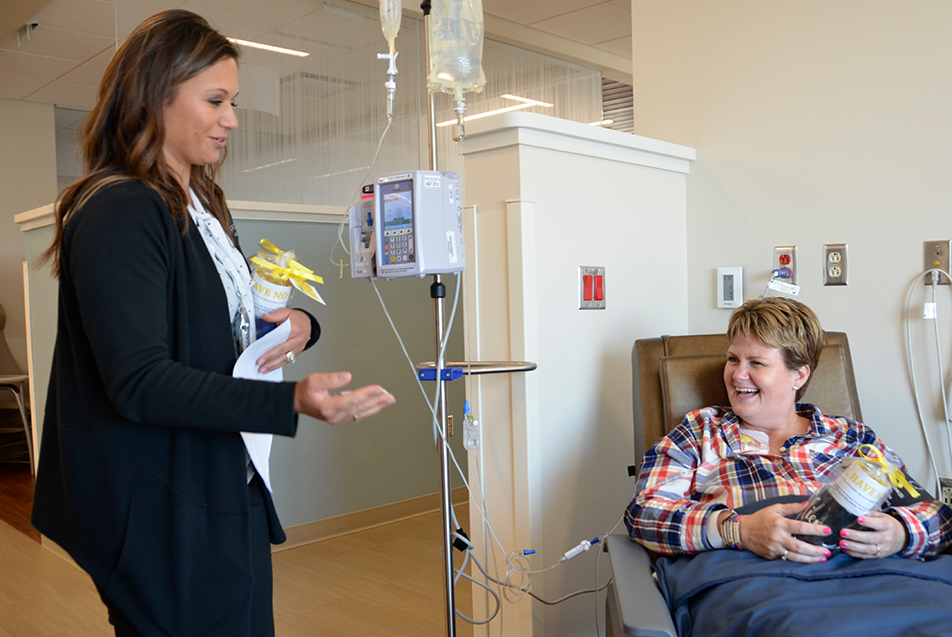
“People say and do the nicest things,” Jackie said, admiring her mug, her eyes growing glassy. “I feel like I’m a grateful person, but man, this is overwhelming. I haven’t cried because I have cancer. I’ve cried because of all of the kindness.”
Tim’s phone buzzed – The oldest daughter, wondering if she had time to make it for Jackie’s treatment. She was coming from across town. I’d been in her company for about two hours, and it was abundantly clear to me that Jackie had people around her, and that she would not be walking this road alone. I noticed the bracelets on her wrist, stacked together. They read: “it is well”, “blessed” and “strength”.
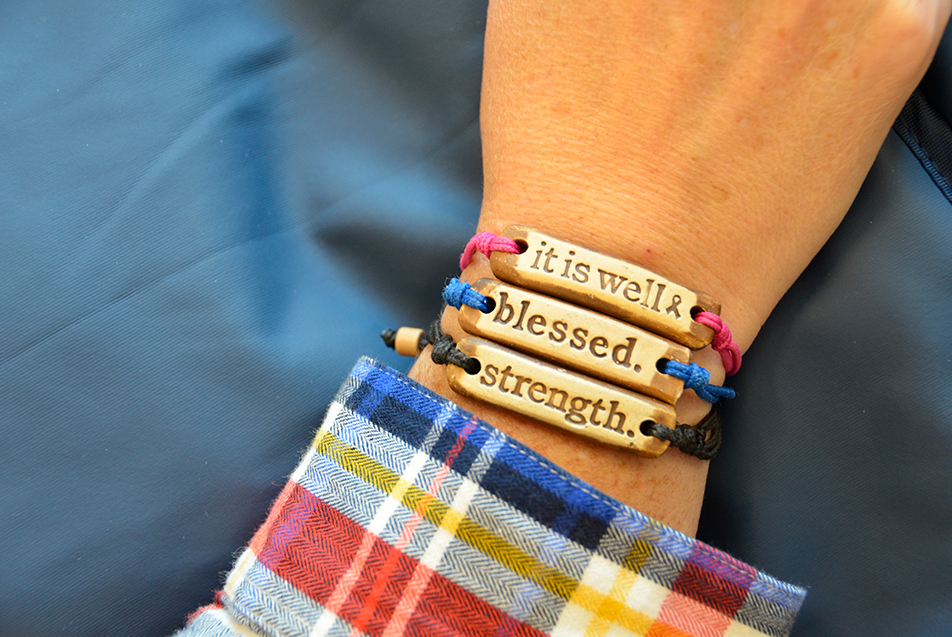
“I love your bracelets.”
“Oh, thanks. I found them and thought they would be a good way to show support for me, or for anybody, really,” Jackie said.
“And 250 bracelets later …” Tim added. Jackie smiled at him, surely thinking of the gesture others repeated so many times over.
“Tim’s mom always used to say, ‘It is well with my soul’,” she shared, tears now pouring down her cheeks (and mine). “And, I don’t know, I’ve just always loved that. I keep coming back to it.” She wiped under her eyes with the side of her hand and collected herself. “This whole thing can only be better if I have a good attitude. Now, I’m not saying I’m not going to bawl when I lose my hair, but that’s OK.”
I grabbed a box of tissue behind me, taking one for myself before passing it.
The nurse broke through the soundtrack of sniffles. “Since this is your first time, I’ll tell you that most people feel the effects of the medication a few days after the treatment,” she said. “Each treatment gets a little harder, but you’ll have more good days than bad.”
She cleaned a spot on Jackie’s arm and put an adhesive Neulasta® injector near her shoulder. Within 24 hours the patch will release a bone marrow stimulator into the bloodstream through a tiny needle so that Jackie’s body will make white blood cells. This spares the patients from coming back the day after their treatment for a shot. The Neulasta beeped and then, Snap! It released the needle into her arm. I jumped ten feet out of my chair, and Jackie snickered. She was unphased.
One down.
Friday, September 28, 2018
I looked down at my phone again. Still no text from Jackie. How strange. I decided to take the elevator up to the third floor and do a quick lap. Maybe it was my cell phone acting up. As soon as the doors opened, I saw her. She was standing in the waiting area outside of infusion.
“Hey!” she said, flashing that now-familiar smile, as I opened my arms for a hug. “I was just getting ready to text you. My labs came back and my white blood count is too low. I can’t get my treatment today. I’m so sorry!”
“Don’t be sorry!” I said.
“I just don’t know what I did,” she said, in the same apologetic tone.
“Nothing!” I assured her, and we made our way to the elevator.
For Jackie, this didn’t just mean missing her treatment that day. This meant a complete shift in the treatment schedule, from Fridays to Mondays. Behind her twinkling eyes and forced grin, I could see the disappointment. There had been a plan, with freezer meals and carpools and friends traveling in from neighboring cities. This was not in the plan.
I gave her another hug and promised to meet her right back here in a few days.
Monday, October 1, 2018
Jackie’s head has a lovely shape to it.
“I was playing with my hair while I was watching TV and it started falling out, so I decided to be proactive. I just put a sheet down and had a little buzz party.”
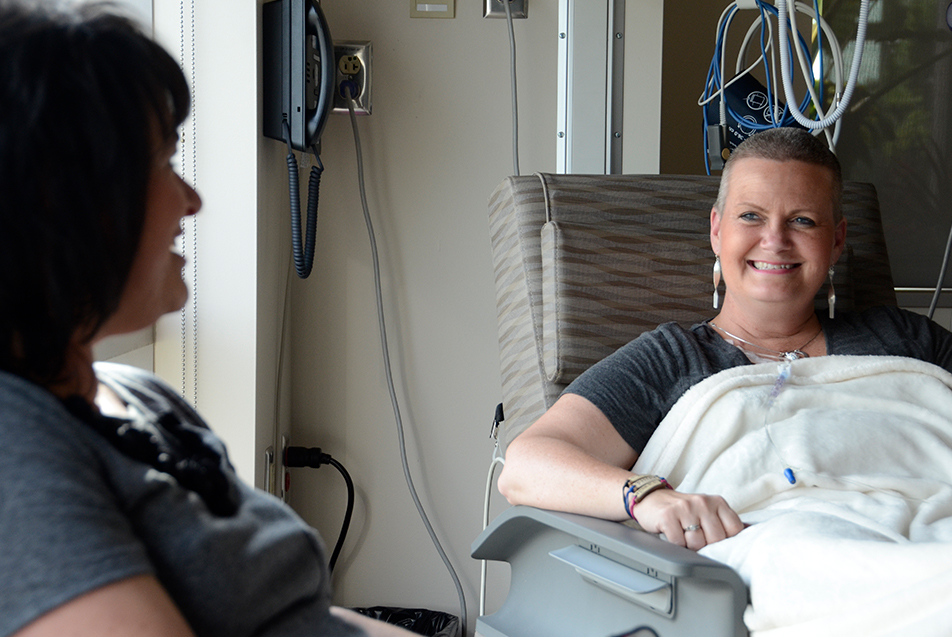
“Well, it looks great!” I said. “You have a beautifully shaped head.”
“I know, right?” Jackie’s friend, Laura, added.
“How do you feel?” I asked.
“I feel fine. That night, after my last treatment, I had a headache and I was a little dizzy, but otherwise, I feel great.”
“Good!” I said.

They were finishing up her steroid, which helps with the nausea and side effects. It was taking some time to get the chemo medications delivered, but Jackie had drawn the lucky straw and we were set up in the spaceous Celebration Suite, typically reserved for patient's receiving their last treatment. We had no problem filling the big, bright room with good company and conversation. Laura was fielding text messages from Jackie’s phone. There was a volleyball game and everyone had to be there by 5 o’clock. At 3:55 p.m., it was clear that Jackie was not going to make it.
These are the logistics of being a woman with cancer. The hands don’t stop moving around the clock. They don’t call the games or postpone the dances. The world keeps turning and there, somewhere on top of it, the patient has to find a way to balance one more thing. If you’re lucky like Jackie, you have a lot of people to help hold it all together, but you never fully stop engineering the inner workings of your household. You just do it with a migraine and a sharp new hairstyle.
“Coming into this, I knew that I could handle it, but I prayed I wouldn’t miss my girls’ stuff,” Jackie said.
“How are they handling everything?” I asked.
“They’ve all had their moments, but between church, school, family and friends, we are all covered in prayer,” Jackie said. “We had a pink out game last week. Both teams participated, and we raised $2,000 for the Parkview Cancer Institute. Each of my girls read something they’d written. I ugly cried.”
“You’re allowed to ugly cry,” I offered.
“I had a friend come from Wabash over the weekend and she filled my freezer with food. I was worried she wouldn’t come because I didn’t get my treatment, but she did.”
“That’s so awesome,” I said. “That will come in handy if the dizziness comes back.”
“Oh, no, I really don’t have time for side effects this week. We have senior night.”
Two down.
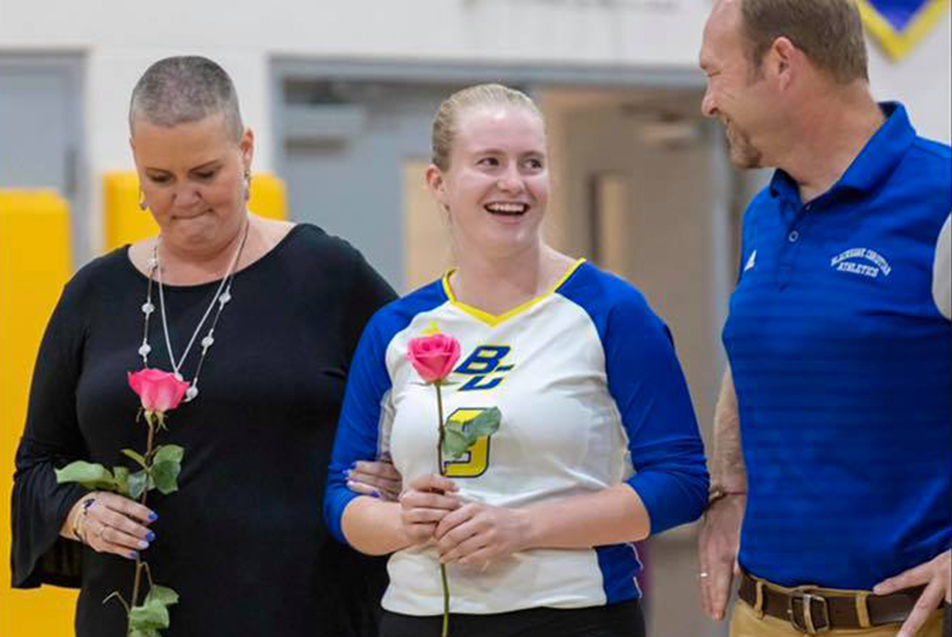
Monday, October 15, 2018
Jackie was eating ice chips while the nurse steadily pushed the cherry red chemo. The snack is supposed to keep mouth sores at bay.
We jumped right into our visit. Sitting with Jackie felt a lot like catching up with a girlfriend with whom I kept a recurring coffee date. She, like me, has three daughters. She, like me, is balancing the full tray of work and after school activities and marriage and important friendships and self-care. I saw more and more of myself in Jackie every time we spoke, and I knew this treatment was especially bittersweet, because this would be my last with the woman I’d grown to admire so much.

“How are you feeling?” I asked.
“After the last treatment I got a migraine that night,” she said. “Then again a day later. I feel bad even complaining. There’s a list of like 20 common symptoms and I really don’t have any of them.”
All of the hair on her head was gone now. She looked sophisticated in a slate gray Emily Kai cap and fashionable, dangly earrings. “It was so short and rubbing on my pillow, so I had to give it a good shave,” she said, rubbing her forehead. “Like a baby’s butt! And, like my girlfriend said, it’s a great excuse to wear big statement earrings.”
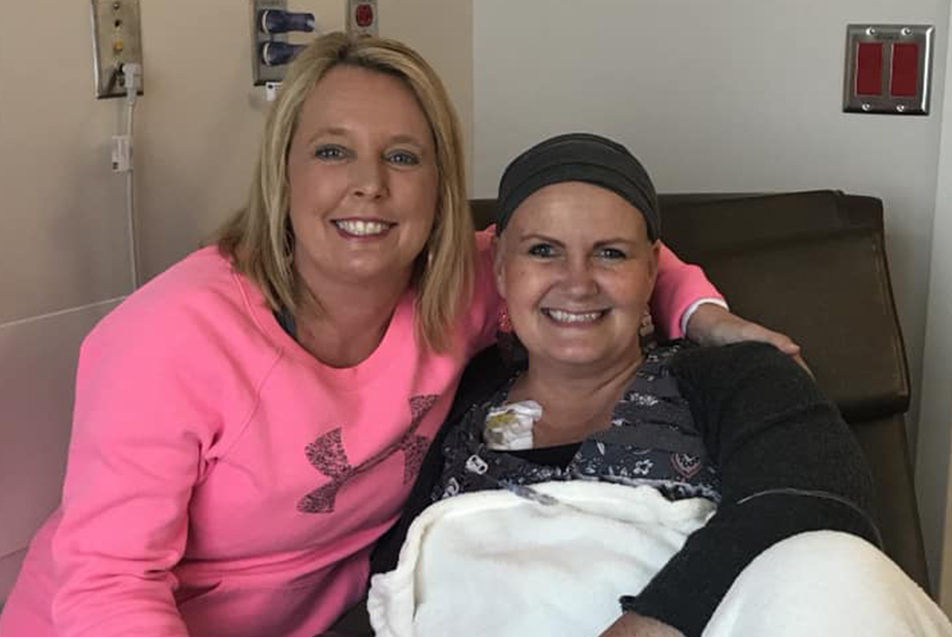
Her friend, Missy, was there. Missy is a breast cancer survivor, three years out. “I have two friends going through this right now,” she said, “so I’m just trying to be positive for them. The one friend feels like she’s been hit by a truck, and I remember that feeling – the body aches and the mouth sores. But I just hiked 7 miles with my husband, so there is another side. There’s just too much left for us to see. Right, Jackie?”
“Maybe because I work here, I don’t know, but this is not scary for me. God’s peace just washed over me,” Jackie said. “And it’s funny, you know you have friends, but the way people have loved on my kids … The cards and the texts and the food.”
“Has this diagnosis changed the way you think about your health?” I asked.
“Oh yeah! This whole thing has made me slow down and be still.”
Stillness. What a concept. Too often we wait until the quiet is pushed upon us, whether through illness or chance. But voluntary stillness, and the thoughts waiting for us when we create that space, are a gift we forget we’re allowed to open every single day.
The weekend before, I’d finished reading “My Grandfather's Blessings: Stories of Strength, Refuge, and Belonging” by Rachel Naomi Remen. I told Jackie that, in the book, the author says that someone told her, “Silence is like sitting in God’s lap.” She nodded, a slow, content sign of understanding and recognition.
As I packed up my camera and my notebook to walk out with Jackie for the last time, I felt my own sense of peace. Peace that Jackie was just beginning. Beginning to fight, beginning to heal, beginning to rebuild, with the help of more hands than she can count. I have every confidence that when I go and see her ring that bell at her last treatment, she will be on an epic rise toward recovery. People like Jackie, with their smiles and their optimism, always rise. There’s too much to do and too much to see to stay low for too long. And anyway, that’s what warriors do. They rise.
Keep up the good fight, Jackie. Thank you for letting me sit beside you, In the light of your smiles and soaring spirit.
Three down, my friend. Three down.

